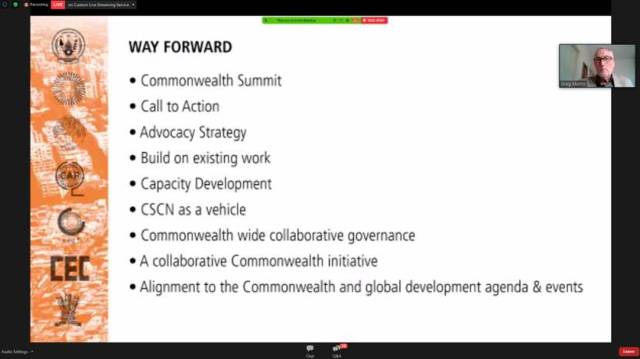 The Call to Action points from the final Sustainable Cities meeting
The Call to Action points from the final Sustainable Cities meeting
After a 10-week programme, Commonwealth planners have put forward a blueprint for improving existing cities and building better urban areas in the future.
Under the shadow of the coronavirus pandemic lockdown, the series of Zoom meetings was launched by Prince Charles in June. It ended on 2 September with a final Zoom session and an action plan.
The final Call to Action is a roadmap to collaborate on planning, training and building expertise to serve up innovative ideas for the Commonwealth’s future urban developments.
Five different bodies came together to produce it:
- The Association of Commonwealth Universities
- The Commonwealth Association of Architects
- The Commonwealth Association of Planners
- The Commonwealth Local Government Forum (CLGF)
- The Prince’s Foundation
- The incoming Commonwealth Chair, Rwanda.
“This is the Commonwealth at its very best and a joy to behold,” Commonwealth Secretary-General Patricia Scotland told the closing session. She pointed out that almost 50% of the projected global increase in urban population by 2050 was forecast to be in the Commonwealth.
Rwanda’s Local Government Minister, Shyaka Anastase, told the meeting that the Call to Action points would be put in place during Rwanda’s time as Commonwealth chair-in-office from 2021.
“The Call to Action for Sustainable Urbanisation reconciles the theory and practice, the policy and its implementation towards sustainable and transformational impact,” Prof Anastase told the closing session.
A “post-Covid lens”
The final session’s speakers reflected the shared experience from a diverse range of cities – from Bristol to Mumbai and Cape Town to Kigali.
The Secretary General of the CLGF, Greg Munro, who chaired the session, said that the associations would aim to put the Call to Action on the agenda of Commonwealth leaders and seek funding for a full capacity building programme, making the programme a Commonwealth-wide priority.
The impact of the Covid-19 pandemic influenced the discussion from start to finish. Prince Charles told the June launch that the world could see more clearly the need for development that heals rather than harms, through what he called a “post-Covid lens”. In the final session in September, Bristol’s Mayor, Marvin Rees, pointed out that “Covid is not a great leveller” and urged planners to design cities which are “resilient to future shocks”. He said that Commonwealth networks should use the lessons of the benefits of lockdown – improved air quality, more use of public transport – to design sustainable cities in the future.
Taking the example of India, the Director of the Indian Institute of Human Settlements, Aromar Revi, said that discussions about building the cities of the future should not neglect the need to upgrade the Commonwealth’s existing urban areas – to “think ahead, but work today with what we have”.
The Commonwealth Sustainable Cities website will remain live in the countdown to the next Commonwealth Heads of Government Meeting.
Listen to the Sustainable Cities recording of the closing session
Building sustainable cities – the launch of the programme



